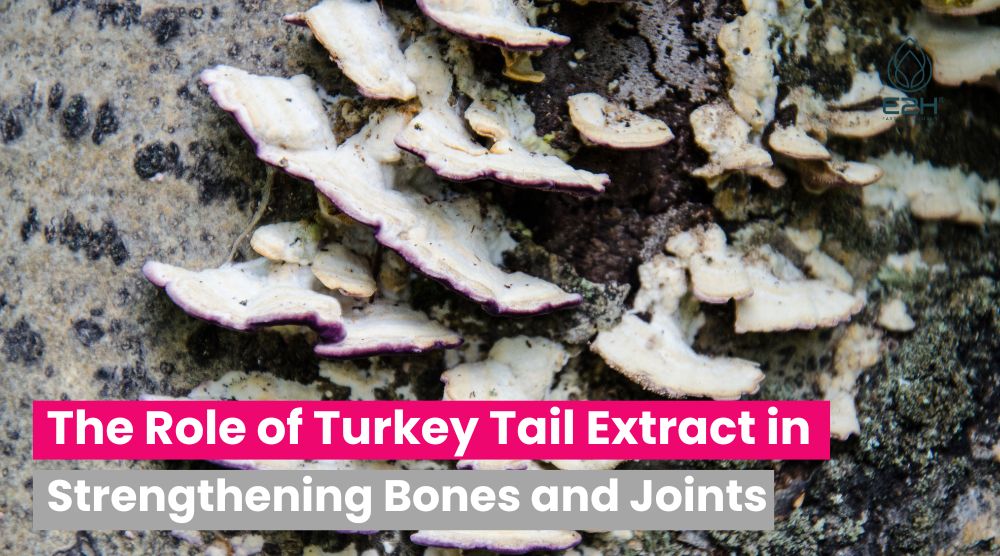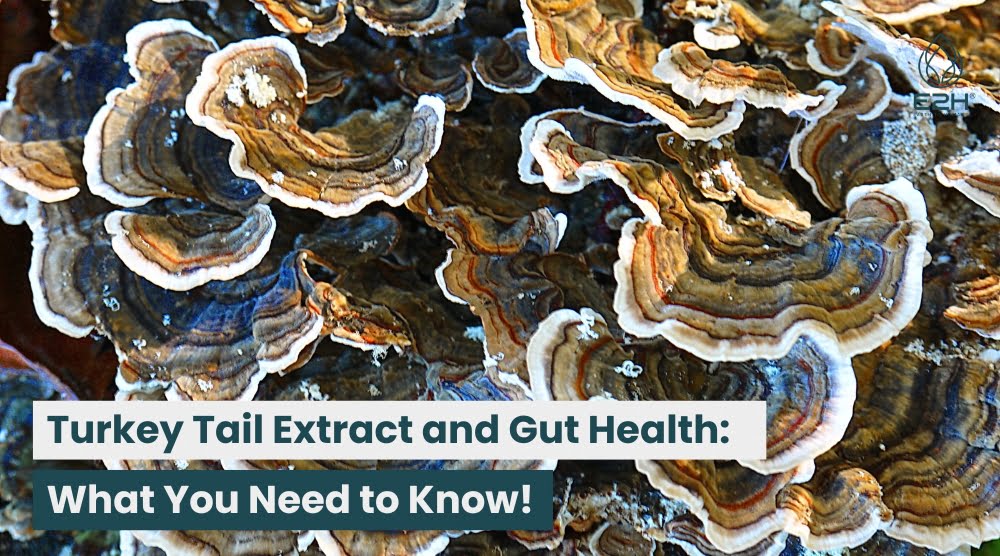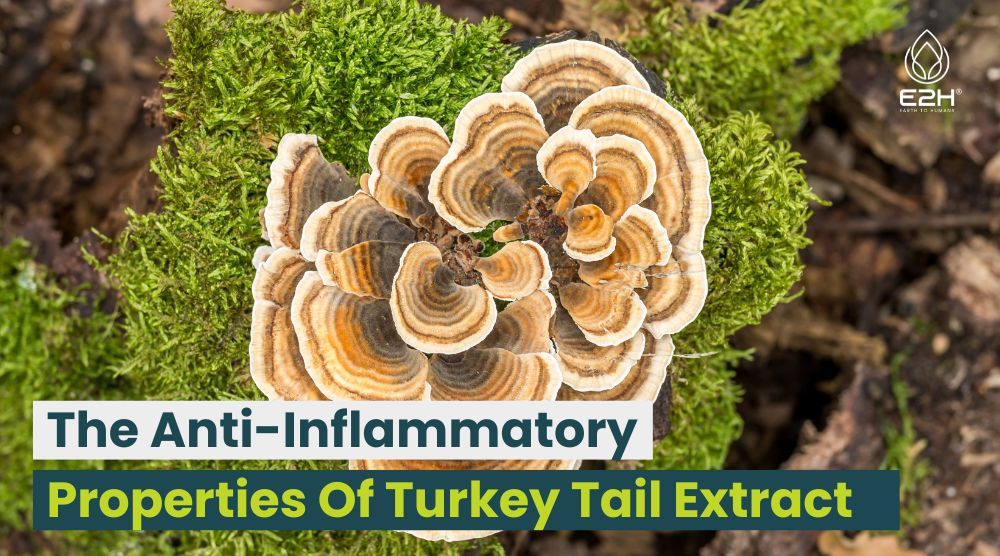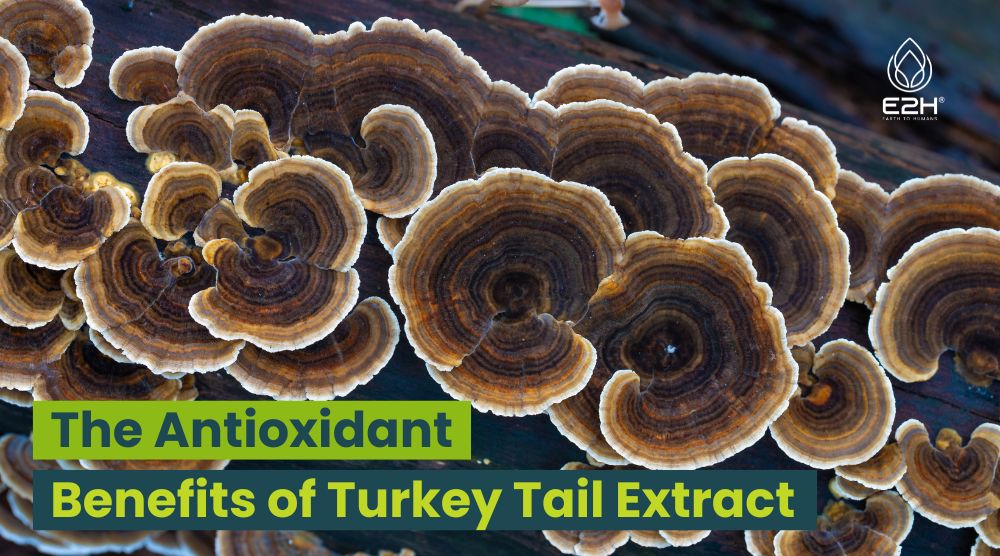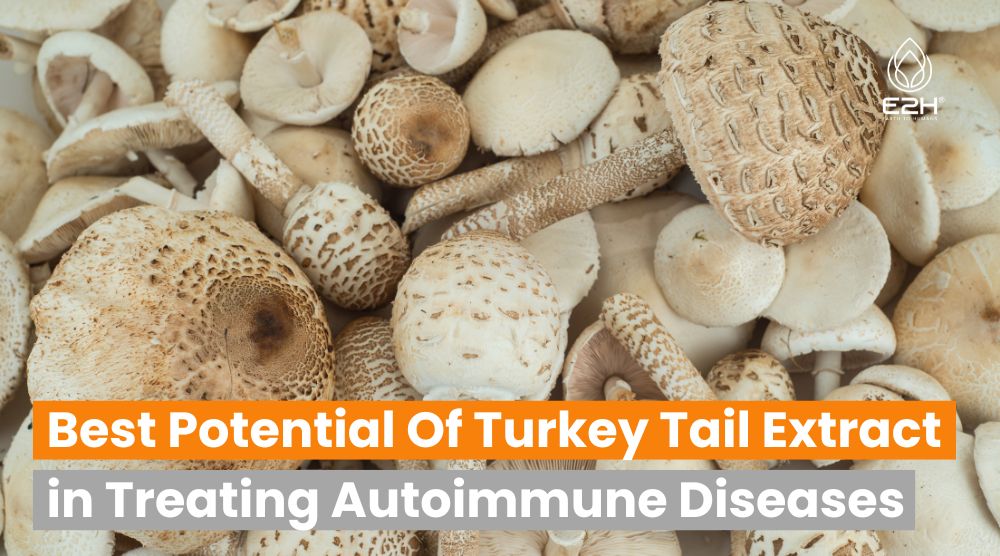Turkey Tail Extract And Its Antimicrobial Properties: Turkey Tail extract is known for its impressive antimicrobial properties. The bioactive compounds present in the extract, such protective compounds such as polysaccharides, phenols, flavonoids, and triterpenoids, contribute to its ability to combat a broad spectrum harmful species of bacteria, viruses, and fungi, making it a promising natural remedy for addressing microbial infections.
What is Turkey Tail Extract?
Turkey Tail extract is a concentrated form of the medicinal mushroom Trametes versicolor, commonly known as Turkey Tail mushroom extracts. It is obtained by extracting the bioactive compounds from the mushroom, including polysaccharides, phenols, flavonoids, and triterpenoids. This extract is often used for its potential health benefits, such as antimicrobial properties, immune system support boost immunity, and its role in complementary cancer treatments.
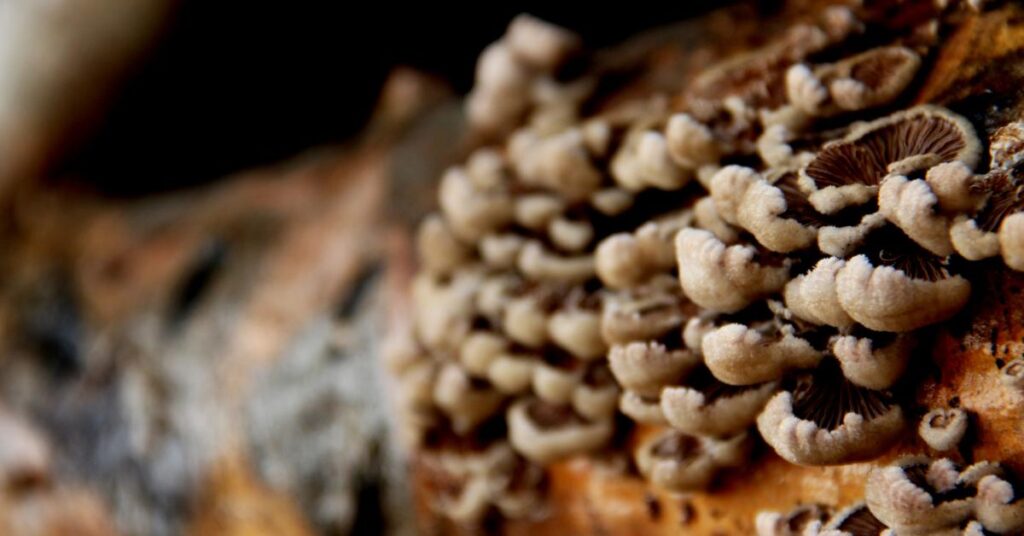
The Science behind Turkey Tail Extract and Its Antimicrobial Properties
Scientific studies have revealed the fascinating antimicrobial properties of turkey tail extract. The extract contains a diverse range of bioactive compounds, including polysaccharides, phenols, flavonoids, and triterpenoids, which contribute to its medicinal effects. These compounds have been found to exhibit potent antimicrobial activity against a broad spectrum of bacteria, viruses, and fungi. The mechanisms through which turkey tail extract exerts its antimicrobial effects are multifaceted and involve modulation of the immune system, disruption of microbial cell walls, and inhibition of microbial growth.
Key Bioactive Compounds in Turkey Tail Extract
Turkey tail extract owes its antimicrobial properties to several key bioactive compounds. Polysaccharides, such as beta-glucans, are abundant in turkey tail mushrooms and have been extensively studied for their immune-enhancing effects. These compounds stimulate the activity of immune cells, promoting the body’s defense mechanisms against pathogens.
Phenols and flavonoids found in turkey tail extract possess antioxidant properties and help combat oxidative stress caused by harmful microorganisms. Triterpenoids, another important class of compounds, exhibit antiviral and antifungal properties, making turkey tail extract a promising natural remedy.
What are the active compounds in Turkey Tail mushroom?
Turkey Tail mushroom contains several active compounds, including polysaccharides (such as beta-glucans), phenols, flavonoids, and triterpenoids. These bioactive compounds contribute to its antimicrobial properties and immune-modulating effects.
The polysaccharides, in particular, have been extensively studied for their immune-enhancing abilities, while phenols, flavonoids, and triterpenoids possess antioxidant, antiviral, and antifungal properties. The synergistic combination of these compounds makes Turkey Tail medicinal mushroom into a potent natural remedy.
The Antimicrobial Potential of Turkey Tail Extract
Turkey Tail extract possesses significant antimicrobial potential due to its bioactive compounds, including polysaccharides, phenols, flavonoids, and triterpenoids. These compounds contribute to its ability to combat a broad spectrum of bacteria, viruses, and fungi.
The extract has shown efficacy against bacteria such as Escherichia coli and Staphylococcus aureus, inhibitory effects on viruses like human papillomavirus (HPV), and antifungal properties against Candida species. Its antimicrobial activity, combined with its immunomodulatory effects, positions Turkey Tail extract as a promising natural option for addressing microbial infections and supporting overall health.
Scientific Evidence on Turkey Tail Extract’s Antimicrobial Effects
Scientific research has provided evidence of the antimicrobial effects of Turkey Tail extract. Studies have demonstrated its efficacy against various bacteria, including Escherichia coli, Staphylococcus aureus, and Helicobacter pylori. In terms of antiviral activity, Turkey Tail extract has shown inhibitory effects against human papillomavirus (HPV) and herpes simplex virus (HSV).

Furthermore, its antifungal properties have been observed against Candida species. These findings highlight the broad-spectrum antimicrobial potential of Turkey Tail extract. The bioactive compounds present in the extract, such protective compounds such as polysaccharides, phenols, flavonoids, and triterpenoids, are believed to be responsible for these effects, making Turkey Tail extract an intriguing natural alternative for combating microbial infections.
Utilizing Turkey Tail Extract for Health and Wellness
Turkey Tail extract can be utilized as a valuable tool for promoting health and wellness. Its antimicrobial properties, combined with its immune-modulating effects, make it a promising natural remedy. Incorporating Turkey Tail extract into a health routine can help support the immune system, combat infections, and promote overall well-being.
It can be consumed as a supplement in the form of capsules, powders, or tinctures. Additionally, brewing it into a tea or incorporating it into meals can provide a flavorful and nutritious way to reap its benefits. Consulting with a healthcare professional is advised before adding Turkey Tail extract to a health regimen.
How to Incorporate Turkey Tail Extract into Your Health Routine?
There are several ways to incorporate Turkey Tail extract into your health routine. One option is to take it as a supplement in the form of capsules or tinctures, following the recommended dosage on the product label. Another method is to brew Turkey Tail extract into a tea by steeping dried mushrooms in hot water for an extended period.
This soothing tea can be enjoyed daily. Additionally, you can incorporate Turkey Tail extract into your meals by adding it to soups, stews, or stir-fries. However, it is essential to ensure the quality and proper identification of the mushrooms before consumption. Consulting with a healthcare professional is recommended to determine the best approach to turkey tail benefits for your specific needs.
Is turkey tail mushrooms antibacterial?
Yes, turkey tail mushrooms have been found to exhibit antibacterial properties. Research has shown that the bioactive compounds present in turkey tail mushrooms, such as polysaccharides, phenols, flavonoids, and triterpenoids, contribute to their antibacterial effects.
Studies have demonstrated the ability of turkey blood sugar and turkey tail mushroom benefits and extracts to inhibit the growth of harmful bacteria like Escherichia coli and Staphylococcus aureus. These antimicrobial properties make turkey tail mushrooms a promising natural option for addressing bacterial infections and promoting overall gut health. However, it is important to note that further research is needed to fully understand and harness the antibacterial potential of white blood cells from turkey tail mushrooms.
How does turkey tail support the immune system?
Turkey Tail supports the immune system through its immunomodulatory properties. The polysaccharides, particularly beta-glucans, found in turkey tail mushrooms stimulate the activity of immune cells such as macrophages, natural killer cells, and T-cells. These compounds enhance the immune response, helping to fight off infections and maintain overall immune health.
Additionally, turkey tail mushrooms contain other bioactive compounds like phenols and flavonoids, which possess antioxidant properties that can reduce oxidative stress and support the immune system health and function. By promoting immune system balance and activity, turkey tail mushrooms contribute to overall immune system support liver health.
What is turkey tail extract good for?
Turkey tail extract is known for its versatile health benefits. It is primarily valued for its antimicrobial properties, as it has demonstrated efficacy against various bacteria, viruses, and fungi. Additionally, turkey tail extract supports immune system function by stimulating immune cells and promoting immune response.
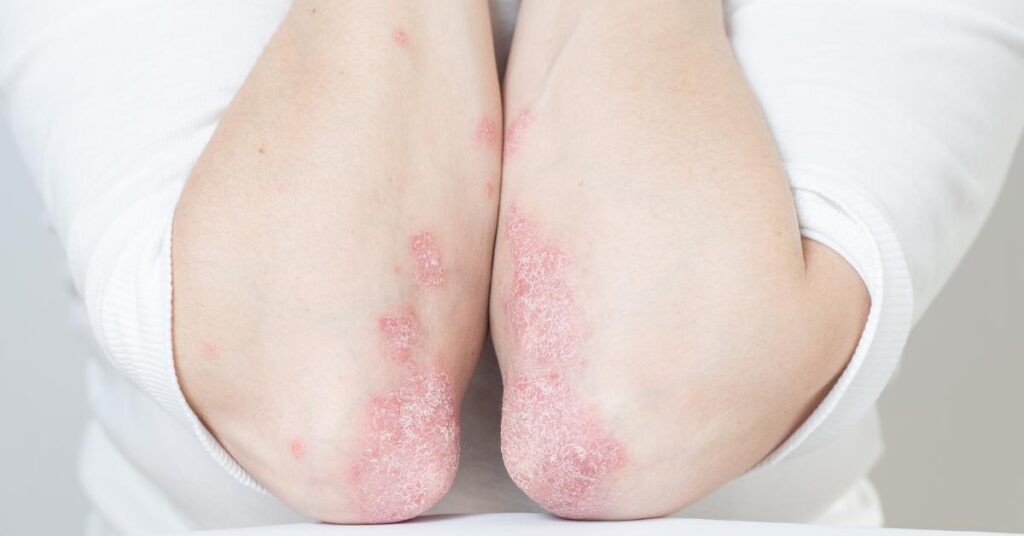
Its antioxidant compounds help combat oxidative stress. Turkey tail extract has shown promise in applications such as treating respiratory, urinary, and gastrointestinal infections, supporting the immune boosting wound healing, immune boosting the response, immune boosting,, and promoting oral health body weight too. Its wide range of bioactive compounds makes turkey tail extract a valuable natural remedy for overall health and wellness.
Is turkey tail an antifungal?
Yes, turkey tail mushrooms have antifungal and antibiotic properties too. The bioactive compounds present in turkey tail mushroom itself, such as polysaccharides, phenols, flavonoids, and triterpenoids, contribute to its antifungal effects. Studies have demonstrated its effectiveness against various fungal species, including Candida.
The compounds in turkey tail mushroom benefits its extract help inhibit the growth and development suppressing harmful species of fungi, making it a potential natural remedy for fungal infections. However, further research is needed to fully understand and utilize the antifungal potential of turkey tail mushroom benefits, edible mushrooms, and their extracts.
Turkey Tail Mushroom Can Support Cancer Treatments?
Emerging research suggests that turkey tail mushroom, due to its immune-modulating and antioxidant properties, may have a supportive role in breast cancer and treatments. The polysaccharides in turkey tail mushroom, particularly the beta-glucans, can enhance the activity of immune cells, potentially aiding in cancer immunotherapy.
Additionally, its antioxidant compounds help reduce oxidative stress, which may be beneficial during cancer treatments. While turkey tail mushroom shows promise, it is crucial to note that it should not be used as a standalone treatment and must be discussed with healthcare professionals as part of an integrative approach to breast cancer and care.
Does Turkey Tail Helps Prevent and Treats the Common Cold and Flu?
Yes, turkey tail mushroom has been shown to have antiviral properties that may help prevent and treat the common cold and flu. The polysaccharides found in turkey tail mushroom have been found to stimulate the immune system, which can help fight off viral infections.
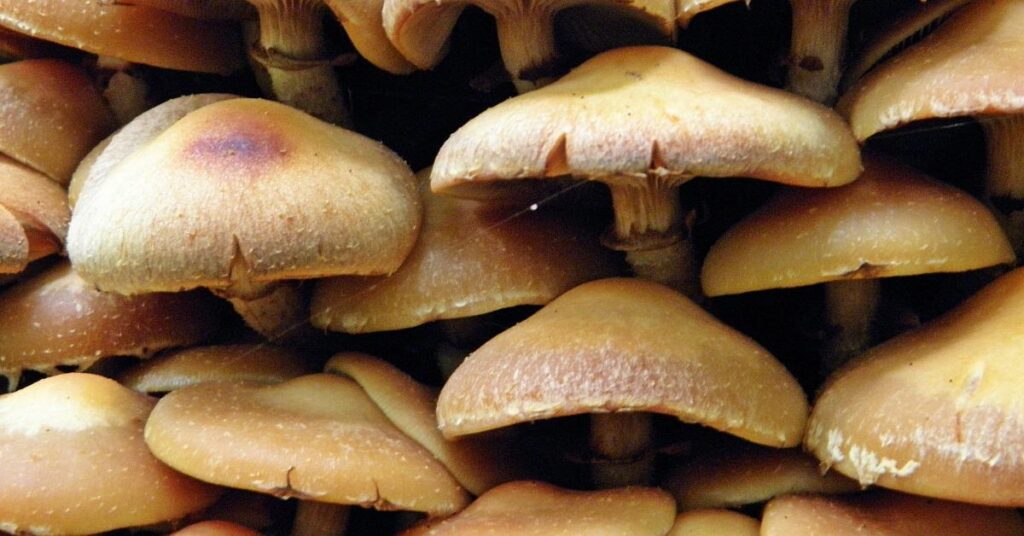
Additionally, the antioxidant compounds in turkey tail mushroom can help reduce inflammation and oxidative stress associated with respiratory infections. While more research is needed to fully understand the potential benefits of consuming turkey tail mushroom for the common cold and flu, it may be a useful natural remedy for supporting respiratory health.
What are the potential benefits of taking medicinal mushrooms?
Medicinal mushrooms, including turkey tail, have a wide range of potential benefits for human health. These benefits may include:
- Immune system support: Medicinal mushrooms are rich in beta-glucans and other bioactive compounds that stimulate immune cells and support immune function.
- Antioxidant properties: Many medicinal mushrooms contain potent antioxidants, which can help protect against oxidative stress and inflammation.
- Anti-inflammatory effects: The bioactive compounds in medicinal mushrooms may help reduce inflammation throughout the body.
- Anti-cancer properties: Certain medicinal mushrooms, including turkey tail, have shown promise in supporting cancer treatments through their immune-modulating and antioxidant properties.
- Cardiovascular health: Some medicinal mushrooms, like reishi, have been shown to improve cardiovascular health by reducing blood pressure and cholesterol levels.
Overall, the medicinal properties of mushrooms have a diverse array of potential benefits and are an exciting area of research for natural health remedies.
Is Turkey Tail The Holy Grail Of Medicinal Mushrooms? (Ultimate Guide)
FAQs
Are there any side effects associated with turkey tail extract?
Turkey tail extract is generally safe for consumption. However, some individuals may experience mild gastrointestinal discomfort or allergic reactions. It is advisable to consult with a healthcare professional before starting turkey tail mushroom liquid extract or any new dietary supplement or herbal regimen.
Can turkey tail extract be used alongside conventional medications?
It is essential cancer patients to consult with a healthcare provider before combining turkey tail extract with any prescription medications to avoid potential interactions.
Is turkey tail extract suitable for everyone?
While turkey tail extract is generally safe, pregnant and breastfeeding women, as well as individuals with specific medical conditions or allergies, should consult their healthcare provider before using it.
How long does it take to experience the benefits of turkey tail extract?
The timeline for experiencing the benefits of turkey tail extract may vary among individuals with lung cancer. It is important cancer patients to remember that natural remedies generally require consistent use over time to see noticeable effects.
Conclusion
Turkey Tail extract holds great promise as a natural antimicrobial agent. Its active compounds exhibit potent antimicrobial, antiviral, and antifungal properties, offering a holistic approach to combatting infections, reducing inflammation, and supporting overall gut health. While Turkey Tail extract can be a valuable addition to one’s wellness routine, it is essential to seek professional advice and rely on scientific evidence when considering its use.


